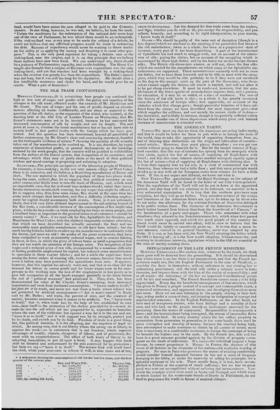IMPEACHMENT OF THE LATE FRENCH MINISTERS.
MORNING CHRONICLE—We confess that, whatever he the result, we think great good will be derived front the proceeding. If it should be determined that where there is no law there is no transgression, and that the French Le- gislature ought not, like the English Parliament in the case of Strafford, io consider the facts in themselves, without reference to any existing law as authorizing punishment, still the trial will strike a salutary terror in func- tionaries, and impress them with the idea of the reality of responsibility ; and at all events, the deficiency of the law on important Constitutional points will be felt and remedied. The French Revolution cannot even yat be fully appreciated. Every day the beneficial consequences of that measure, which has given to France a people instead of a corrupt and contemptible court, a tyrannical aristocracy, and oppressed slaves, are developing themselves more and more. Here we see men belonging to the people, sharing in their feel- ings, acting under a sense of duty, and evincing an indignation at corrupt and unprincipled measures. In the English Parliament, on the other hand, we have men of overgrown estates, who have feelings and a morality of their own, and who look on the people merely as instruments necessary for the procuring them the means of enjoyment. Responsibility is consequently a farce ; and the fountain-head being corrupted, the stream of immorality flows over the whole land. In every country where the law suffers property to accumulate from generation to generation in the same hands, there must be gross corruption and worship of money, because the standard being high, men are tempted to make exertions to obtain by all manner of means more than is necessary to a comfortable existence, to escape the contempt of being far beneath the highest step in the scale. By the French law, this evil has been in a great measure guarded against, by the division of property conse- quent on the death of individuals. If a successful individual acquire a large fortune, he cannot perpetuate it. Hence, in France, the absence of that worst of all features in the character of this nation—the exclusive worship of property. No man in Paris who possesses the means of existing comfortably would consider himself degraded because he has not a score of lacqueys lounging in his lobby, or under the necessity of selling his principles for a splendid equipage to his wife. These results have, it is true, been accom- plished in France at the expense of much suffering; but we fear no great good was ever yet accomplished without suffering and inconvenience. Cer- tainly the attempts which were made in Spain and Portugal, and which were so much lauded by the aristocratic friends of liberty in Parliament, do not tend to prepossess the world in favour of nominal changes.


















 Previous page
Previous page